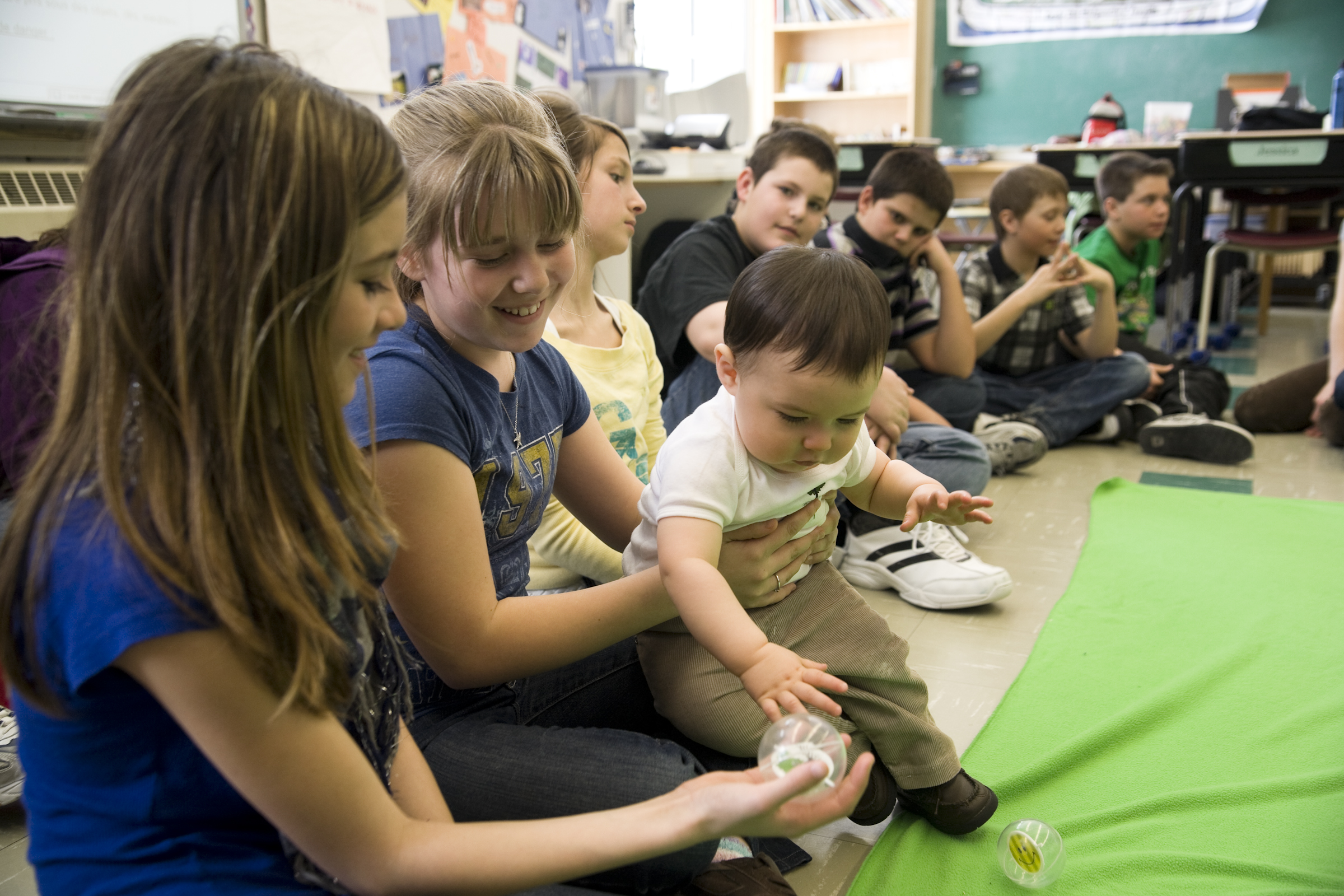By Roots of Empathy Manager of Research, Emily Standfield
Roots of Empathy is committed to delivering empathy programmes that children and teachers tell us work. During the last few years of challenging and isolating pandemic learning, Roots of Empathy not only followed children where they were doing most of their learning – online – we also measured what they thought about our virtual Recovery Programme. And now that that children are back in classrooms, the feedback from our traditional experiential programmes with a “a baby on a Green Blanket” last conducted in 2019, shows that there is even greater potential in going back to classrooms to help more students ‘unbottle’ feelings few had the opportunity and ability to express in the last few years. In research, we like data – read on to see the numbers that point to successful outcomes for children from our Roots of Empathy programmes.
Proven help during the pandemic – Feedback on Roots of Empathy
82% of the Roots of Empathy programmes were delivered virtually during the 2021-2022 school year, through the Recovery Programme, and 18% were delivered in the classroom with our traditional format. Unfortunately, due to the nature of the pandemic, about half of classrooms that we normally reach with the Roots of Empathy programme – missed out. Many classes were closed to visitors. But those students we did reach, responded resoundingly well to the Roots of Empathy programmes according to our 2022 Global Annual Programme Evaluation:
Goal: Fostering the development of emotional literacy and empathy
- 78% of students reported that because of their Roots of Empathy classes, they are able to recognize how the baby is feeling
- 85% of students reported that Roots of Empathy has helped them to learn that everybody has feelings
Goal: Promoting children’s prosocial behaviours and reducing levels of bullying and aggression
- 88% of students reported that if they saw a student or friend being bullied or treated meanly, they would help them
- 87% of students reported that they would try to help someone who feels sad, scared, or lonely
Did you know?
Zeroing in on 2020-2021 and the Recovery Programme, we also measured specific feelings students could give voice to during the pandemic. Read our 2020-2021 Report

Goal: Preparing students for responsive parenting
- 91% of students reported that babies do better when they are loved and cared for
Goal: Preparing students for responsible citizenship
- 88% of students reported that they think it’s wrong that some people get excluded because they are different
- 79% of students reported that they think they treat everyone the same, even if they are different from them
In summary, these results are important because….
Children recognized that feelings are universal and demonstrated emotional literacy and empathy. They also showed greater awareness of the negative impacts of exclusion and the unfairness of being excluded just because someone is different from them.
Teachers also felt that their students were greatly impacted by the Roots of Empathy programme, highlighting the positive mental health impacts provided by being able to express oneself and understand that all feelings are okay.
Goal: Promoting students’ mental health, wellbeing, and resilience
- 97% of teachers agreed or strongly agreed that as a result of Roots of Empathy, students have an opportunity to talk about their feelings
- 88% of teachers agreed or strongly agreed that as a result of Roots of Empathy, students have increased their vocabulary of feeling words

What can Roots of Empathy teach the world?
“When you see people being bullied, always help them!”
Speech Bubble: “Stop!”
Grade 1, Belvedere Parkway School, Calgary, Alberta, 2021-2022
Goal: Fostering the development of emotional literacy and empathy
- 79% of teachers agreed or strongly agreed that as a result of Roots of Empathy, students are more empathic to one another
Goal: Promoting Children’s prosocial behaviours and reducing levels of bullying and aggression
- 95% of teachers agreed or strongly agreed that as a result of Roots of Empathy, students understand that all feelings are okay
- 76% of teachers agreed or strongly agreed that as a result of Roots of Empathy, students show more prosocial behaviours (e.g., sharing, helping, cooperating, kindness, inclusion)
Goal: Preparing students for responsible citizenship
- 77% of teachers agreed or strongly agreed that as a result of Roots of Empathy, students are more inclusive or accepting of others who are different from themselves
There is even a brighter side with more upcoming in-class programmes

During the pandemic disruptions of the last 2 school years, children had few opportunities for social development that comes from being around other children and teachers. And as noted earlier, half the children we can usually reach, didn’t even have the usual opportunity to have a Roots of Empathy programme to help them get to know themselves and regulate their emotions.
It’s no wonder that children’s social, problem-solving, and self-regulation skills declined during the pandemic. Teachers around the world have reported that conflict resolution and problem-solving skills have decreased and serious behaviour issues like emotional dysregulation and disruption are more common than they used to be.[i] In other words, children’s behavioural problems have gone up, while their coping skills have gone down. Empathy based mental health programmes like Roots of Empathy are essential in re-teaching these skills, so that children can improve their relationships, increase their positive mental health outcomes, and resolve conflicts.
Good news!
Our Global Annual Programme evaluation on the last year of the traditional (pre-pandemic) Roots of Empathy Programme of 2018-2019 contains feedback from teachers, parents, and Instructors across three continents and in multiple languages – showing the large potential that our programme can make now that it appears 100% of our programming will be back in class.
- 92% of students reported learning that everybody has feelings
- 91% of students reported learning to recognize how the baby is feeling
- 93% of students reported that if they saw a friend being bullied or treated meanly, they would help them
- 86% of students reported that if they saw a student in the playground being bullied or treated meanly, they would help them
- 94% of students reported learning that babies do better when they are loved and cared for
This 2019 feedback shows that children who participate recognize their own feelings and the feelings of others (emotional literacy), stand up against aggression and injustice, and increase their knowledge of infant development.
These are key goals of Roots of Empathy and support what we already know from research evaluations on the programme. Over two decades of independent research has shown that children in the Roots of Empathy Programme experience lasting increases in prosocial behaviours (e.g., helping, caring, sharing, including, kindness), an increase in empathy, and a decrease in aggressive behaviours and bullying [2].
Teachers also noticed a change in their students. In 2019, they reported that children showed less aggressive behaviours, helped others more, and their empathy and emotional literacy increased as a result of Roots of Empathy.

What can Roots of Empathy teach the world? “how [people] can show [their] feelings.”
Captions: “[Scared],” “[Nervous],” “Upset,” “Shocked”
Grade 1 Student, Florence, Oregon, USA, 2018-19
- 89% of teachers strongly agreed or agreed that as a result of Roots of Empathy, students talk more about their feelings
- 91% of teachers strongly agreed or agreed that as a result of Roots of Empathy, students have increased their vocabulary of feeling words
- 89% of teachers strongly agreed or agreed that as a result of Roots of Empathy, students are more empathic to one another
- 88% of teachers strongly agreed or agreed that as a result of Roots of Empathy, students showed more prosocial behaviour (e.g., sharing, helping, cooperating) by the end of the school year
- 87% of teachers strongly agreed or agreed that as a result of Roots of Empathy, students are more inclusive or accepting of others who are different from themselves (including culture, race, special needs, gender, etc…)
Empathy based mental health learning programmes like Roots of Empathy are essential in re-teaching these skills, so that children can improve their relationships, increase their positive mental health outcomes, and resolve conflicts.
As we move into a “normal” school year, it’s clear that both the 2019 and 2022 Global Annual Programme Evaluation results speak to the effectiveness of the programme in increasing empathy, expanding knowledge of infant safety and development, growing awareness of responsible citizenship, and decreasing aggression including bullying – regardless if it is virtual or in person. As Mary Gordon, our Founder and President says, “ We measure what we treasure.”
Learn more about how educators, academics, experts and volunteer instructors and families feel
about Roots of Empathy.
[1] Elisheva L. Cohen & Laura Wangsness Willemsen. “‘Teaching has always been hard, but it’s never been like this’.” The Conversation, January 2022. https://theconversation.com/teaching-has-always-been-hard-but-its-never-been-like-this-elementary-school-teachers-talk-about-managing-their-classrooms-during-a-pandemic-175006.
Lisa Bayrami. “Key Findings: The Implications of Virtual Teaching and Learning in Ontario’s Publicly Funded Schools, K-12.” Ontario Teachers’ Federation, May 2022. http://www.otffeo.on.ca/en/wp-content/uploads/sites/2/2022/05/Key-Findings-Lisa-Bayrami-The-Implications-of-Virtual-Teaching-and-Learning-in-Ontario’s-Publicly-Funded-Schools-K-12.pdf.
Caroline Alphonso. “Summer school helping children close the pandemic learning gaps.” The Globe and Mail, July 2022. https://www.theglobeandmail.com/canada/article-summer-school-helping-children-close-pandemic-learning-gaps/.
GOV UK. (April 2022). Education recovery in schools: spring 2022. https://www.gov.uk/government/publications/education-recovery-in-schools-spring-2022/education-recovery-in-schools-spring-2022
[2] Schonert-Reichl, K. A., Smith, V., Zaidman-Zait, A., & Hertzman, C. (2012). Promoting children’s prosocial behaviours in school: Impact of the “Roots of Empathy” program on the social and emotional competence of school-aged children. School Mental Health 4(1), 1-12.
Santos, R.G., Chartier, M.J., Whalen, J.C., Chateau, D., & Boyd, L. (2011). Effectiveness of school-based violence prevention for children and youth: Cluster randomized controlled field trial of the Roots of Empathy program with replication and three-year follow- up. Healthcare Quarterly, 14, 80-90.
Latsch, D., Stauffer, M., & Bollinger, M. (2017). Evaluation of the Roots of Empathy program in Switzerland, years 2015 to 2017. Full Report. Bern: Bern University of Applied Science.
Connolly P. Miller S, Kee F, Sloan S, Gildea A, McIntosh E, Boyer N, Bland M. (2018) A cluster randomized controlled trial and evaluation and cost-effectiveness analysis of the Roots of Empathy schools-based program for improving social and emotional well-being outcomes among 8- to 9-year-olds in Northern Ireland. Public Health Research 6(4).


